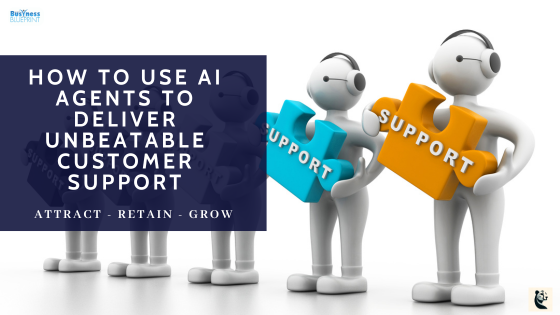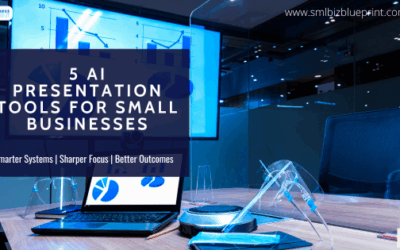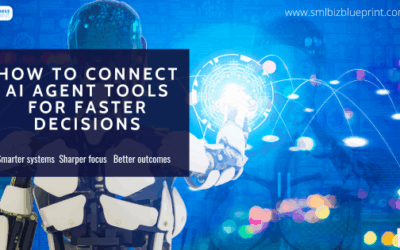Managing customer inquiries, ensuring timely responses, and maintaining satisfaction can be challenging, especially with limited resources.
For many small business owners, the frustration lies in finding a cost-effective way to deliver exceptional support without sacrificing valuable time or money.
Enter AI agents: intelligent, adaptable tools designed to revolutionise customer support.
These AI-driven solutions can work around the clock, handle repetitive queries, and offer personalised interactions, all while freeing up your team to focus on what they do best.
Here’s the exciting part: according to a Salesforce study, over 57% of customers prefer instant responses from AI-powered systems, and businesses that implement AI tools see a significant boost in efficiency and customer satisfaction.
This blog will show how AI agents can transform customer support for your small business. You’ll learn what AI agents are, the key tasks they can automate, and how they stack up against traditional chatbots.
By the end of this guide, you’ll understand how AI can remedy your customer support challenges and help your business grow and stand out in a competitive market.
Let’s get started!

#1 What Are AI Agents, and Why Do They Matter for Small Businesses?
AI agents are advanced, intelligent tools designed to handle customer interactions in a way that mimics human behaviour.
Unlike traditional chatbots, which rely on pre-scripted responses, AI agents use technologies like machine learning (ML) and natural language processing (NLP) to understand context, personalise responses, and improve over time.
This adaptability makes them a powerful asset for small businesses aiming to enhance customer support while managing costs.
For small businesses, the benefits of AI agents are game-changing.
Here’s why they matter:
- 24/7 Availability: Unlike human agents, AI agents don’t need breaks, ensuring that your customers receive assistance at any time of day, even outside business hours.
- Faster Response Times: AI agents can handle inquiries instantly, reducing customer wait times and improving overall satisfaction.
- Cost-Effective Scalability: AI agents allow small businesses to manage increasing customer demands without hiring additional staff, saving on operational costs.
- Improved Customer Experience: AI agents learn from interactions and deliver personalised, accurate responses, making customers feel valued and understood.
How AI Agents Solve Common Pain Points
Small business owners often face delayed responses, missed inquiries, or overburdened staff.
AI agents address these by streamlining repetitive tasks, such as answering FAQs, processing returns, and tracking orders. This allows human agents to focus on more complex or emotionally sensitive issues that require a personal touch.
Tips
- Start Small: Begin with an AI agent that can handle basic tasks like FAQs or order tracking. Expand its capabilities as you grow more comfortable with the technology.
- Integrate AI with Your CRM: Use AI agents to access customer profiles and provide tailored responses based on past interactions.
- Monitor and Refine: Review your AI agent’s performance regularly. Use customer feedback to update its training and responses.
#2 5 Key Tasks AI Agents Can Automate to Enhance Customer Support
For small businesses, repetitive tasks can drain valuable time and resources, leaving staff overwhelmed and customers frustrated.
AI agents are a perfect solution to streamline these tasks, offering faster resolutions, improved efficiency, and better customer experiences.
Below are five key tasks AI agents can automate, helping small businesses optimise their customer support operations.
Answering Frequently Asked Questions (FAQs)
AI agents can instantly respond to common customer inquiries, such as:
“What are your business hours?”
“How can I return a product?”
“Do you ship internationally?”
By automating these repetitive questions, AI agents free up human staff to focus on more complex requests.
Tracking Orders and Deliveries
AI agents can provide real-time updates about order statuses, delivery tracking, and estimated arrival times. This reduces the need for customers to call or email support for routine updates, enhancing their experience and satisfaction.
Processing Returns and Refunds
AI agents simplify the return process by guiding customers through step-by-step instructions, validating eligibility for returns, and even initiating refunds. This speeds up resolution times while ensuring consistency in responses.
Gathering Customer Feedback
AI agents can follow up with customers after purchases or interactions, collecting valuable insights through automated surveys or feedback forms. This data can help small businesses identify areas for improvement and better understand customer needs.
Escalating Complex Issues
When faced with complex or sensitive inquiries, AI agents can identify the need for human intervention and seamlessly transfer the customer to a live representative. This ensures the issue is handled appropriately without frustrating the customer.
Tips
- Prioritise High-Volume Tasks: Start by automating tasks that consume the most time, such as FAQs or order tracking.
- Personalize Responses: Train AI agents to use customer data for more personalised interactions, increasing customer satisfaction.
- Continuously Update AI Knowledge: Keep your AI agent up-to-date with changes in policies, inventory, or processes to ensure accurate responses.
#3 How Affordable Are AI Agents for Small Businesses?
One of the most common misconceptions about AI agents is that they’re only accessible to large corporations with hefty budgets.
The reality is that AI agents are increasingly affordable and scalable, making them an ideal solution for small businesses looking to enhance customer support without breaking the bank.
By investing in AI, small businesses can reduce costs while improving efficiency and customer satisfaction.
Cost Benefits of AI Agents
Lower Operational Costs:
AI agents can handle many customer inquiries, reducing the need to hire additional support staff. Instead of paying for extra team members to manage repetitive tasks, businesses can invest in a cost-effective AI solution.
Subscription-Based Pricing:
Many AI platforms offer subscription models, allowing businesses to start small and scale as needed. Tools like ChatGPT, Drift, or Freshdesk provide pricing tiers that suit different budgets, starting as low as $15–$50 per month for basic capabilities.
Efficiency Savings:
Automating routine tasks means faster response times and fewer manual errors, saving time and resources. Over time, these savings can offset the initial investment in AI implementation.
Comparing AI Agents to Hiring Staff
While hiring additional customer service staff may seem like a viable option, consider the long-term costs:
Salaries, benefits, and training expenses add up quickly.
Conversely, AI agents require a one-time setup and ongoing subscription, often at a fraction of the cost of new hires.
AI agents work 24/7, providing consistent support without overtime pay or burnout.
Affordable Tools for Small Businesses
Freshdesk AI: Affordable plans starting at $18/month for customer support tools powered by AI.
Zoho Desk: For as low as $20/month, you can get AI features like sentiment analysis and chatbot integration.
Tidio AI: Combines live chat with AI automation, starting at $19/month.
These tools allow businesses to automate customer interactions, reduce response times, and improve satisfaction without requiring a significant upfront investment.
Tips
- Start with Free Trials: Test AI platforms with free trials or entry-level plans to understand their functionality and assess ROI before committing.
- Prioritize Key Features: To maximise value, choose platforms with essential features like live chat, FAQ automation, and integration with your CRM.
- Scale Gradually: Begin with basic capabilities and upgrade to advanced features as your business grows or customer demands increase.
Ready to Boost Your Business Knowledge?
Sign up for our newsletter to get the latest in AI, automation, and marketing trends every month.
#4 AI Agents vs. Traditional Chatbots: What’s the Difference?
When exploring automation tools for customer support, small businesses often face a key question: Should I invest in AI agents or stick with traditional chatbots?
While both tools aim to enhance customer interactions, their capabilities and performance differ significantly. Understanding these differences can help you choose the right solution for your business.
Key Differences Between AI Agents and Chatbots
Intelligence and Contextual Understanding:
Traditional Chatbots: Operate based on pre-scripted responses and decision trees. They follow a rigid framework and struggle with unexpected or complex queries.
AI Agents: Use natural language processing (NLP) and machine learning (ML) to understand context, recognise intent, and adapt responses dynamically. They can handle more nuanced and open-ended conversations.
Learning and Adaptability:
Traditional Chatbots: Limited to the initial programming and cannot improve over time.
AI Agents: Continuously learn from interactions, improving their accuracy and effectiveness. For example, they can analyse patterns in customer queries to refine responses and proactively address emerging trends.
Personalisation:
Traditional Chatbots: Provide generic responses with little to no personalisation.
AI Agents: Access customer data from integrated systems like CRMs to deliver tailored responses based on purchase history, preferences, and past interactions.
How These Differences Impact Customer Experience
AI agents offer a superior customer experience by delivering faster, more accurate, and personalised responses.
For instance, an AI agent can respond to a vague inquiry like, “I need help with my order” by identifying the customer, retrieving order details, and providing precise information—all without requiring manual input.
In contrast, a chatbot might respond with, “Can you provide your order number?” adding an extra step that could frustrate the customer.
When to Use AI Agents vs. Chatbots
Traditional Chatbots: Suitable for businesses with low volumes of simple queries or those looking for a quick, inexpensive solution.
AI Agents: Ideal for businesses handling a high volume of diverse queries or seeking to enhance customer satisfaction through personalisation and efficiency.
Tips
- Assess Your Business Needs: A chatbot may suffice if most customer inquiries are repetitive and simple. For more complex needs, invest in AI agents.
- Consider Long-Term Scalability: AI agents grow with your business, making them a better investment as customer demands evolve.
- Focus on Integration: Ensure the chosen tool seamlessly integrates with your CRM or support software for better data utilisation.
#5 Best Practices for Training AI Agents to Handle Customer Queries
Implementing AI agents is a significant step towards improving customer support, but their success heavily depends on how well they are trained.
Properly trained AI agents deliver accurate, relevant, and personalised responses, ensuring customer satisfaction and boosting operational efficiency.
To make your AI agents truly effective, you must follow structured training practices tailored to your business’s unique needs.
Key Steps to Train AI Agents Effectively
Leverage Real Customer Interaction Data
Analyse existing customer queries, support tickets, and emails to identify patterns and frequently asked questions.
Use this data to build a knowledge base the AI agent can reference when responding to customer inquiries.
Example: A small e-commerce business might upload data on common shipping inquiries, such as, “Where is my package?” or “How do I return an item?”
Create Clear Response Frameworks
AI agents should provide consistent responses aligned with your brand’s tone and values.
Design a response framework with proper greetings, concise answers, and a professional tone to maintain brand integrity.
Example: Train the AI to greet customers with a friendly tone: “Hello! How can I assist you today?” instead of generic, robotic responses.
Incorporate Escalation Protocols
Even the most advanced AI agents cannot handle every situation.
Set clear guidelines for when the AI should escalate an issue to a human agent. This ensures that complex or emotionally sensitive cases receive the attention they require.
Continuous Improvement Through Feedback
Training doesn’t stop after deployment.
Regularly review customer feedback and analyse the AI agent’s performance to identify areas for improvement.
Updating the AI with new FAQs, product details, and business policies ensures accuracy and relevance.
Example: A fitness retailer updates its AI agent monthly with new product launches and promotional offers, enabling it to answer questions like, “Do you have discounts on yoga mats this month?”
Tips
- Start Small: Focus on training your AI to handle a specific category of queries (e.g., shipping inquiries) before expanding to more complex tasks.
- Monitor and Adjust Regularly: Use analytics tools to identify where the AI struggles and refine responses accordingly.
- Integrate Customer Feedback: Actively collect feedback on the AI’s performance to address gaps in knowledge or improve response quality.
#6 How AI Agents Improve Customer Satisfaction and Retention
Customer satisfaction and retention are the cornerstones of any successful business. Yet, for many small businesses, limited resources make it challenging to deliver the seamless, personalised experiences that customers demand.
AI agents bridge this gap by enhancing the customer experience through faster responses, tailored interactions, and around-the-clock availability.
Faster Response Times
AI agents significantly reduce wait times by providing instant responses to inquiries. Whether answering FAQs or updating customers on their order status, AI agents eliminate delays that often frustrate customers.
Personalised Interactions
AI agents can access customer data, such as purchase history and preferences, to deliver tailored responses. This personalisation improves customer satisfaction and builds trust and loyalty.
24/7 Availability
AI agents work around the clock, ensuring customers always have access to support, even outside regular business hours. This constant availability enhances convenience and reliability, key factors in customer satisfaction.
How AI Agents Drive Customer Retention
Satisfied customers are more likely to return. By addressing concerns promptly and accurately, AI agents improve the overall experience, reducing churn and increasing loyalty. Businesses that invest in AI agents often see higher repeat purchase rates and longer customer lifecycles.
Tips
- Integrate Customer Data: Ensure your AI agents have access to CRM systems for more personalised and accurate responses.
- Use Proactive Engagement: Train AI agents to send follow-up messages or recommendations, keeping customers engaged.
- Monitor Metrics: Track customer satisfaction scores (CSAT) and response times to gauge the AI agent’s impact and refine its performance.

#7 Overcoming Challenges: Addressing Limitations of AI Agents in Customer Support
While AI agents bring immense benefits to small business customer support, they are not without challenges.
Limitations in handling complex inquiries or maintaining a human touch can lead to dissatisfaction if not addressed.
However, these challenges can be minimised with the right strategies, ensuring that AI agents work seamlessly alongside human support teams to enhance the customer experience.
Handling Complex or Emotional Queries
AI agents excel at answering routine questions but may struggle with nuanced issues or emotionally sensitive situations. For instance, a customer dealing with a delayed delivery due to personal urgency may require empathy that AI alone cannot provide.
Solution:
Establish clear escalation protocols where AI agents recognise such cases and seamlessly transfer them to a human agent. This ensures customers feel heard and valued.
Avoiding Robotic Interactions
While efficient, AI agents can sometimes sound impersonal or overly scripted, which may alienate customers.
Solution:
Train AI agents to adopt a conversational tone aligned with your brand’s voice. Incorporate friendly language and personalise responses whenever possible to make interactions feel more human.
Keeping AI Knowledge Updated
AI agents rely on pre-fed data and algorithms to provide accurate responses. Outdated information, such as policy changes, product details, or pricing, can lead to incorrect answers and customer frustration.
Solution:
Update the AI knowledge base regularly with new FAQs, product updates, and customer insights. This ensures the AI agent remains accurate and relevant.
Building an AI-Human Support System
Creating a hybrid system where AI agents and human representatives collaborate effectively is the key to overcoming these challenges.
AI can handle routine inquiries and gather information, while humans step in for complex cases, providing empathy and creative problem-solving. This balanced approach ensures customers receive the best of both worlds: speed and personalisation.
Tips
- Monitor AI Performance: Use analytics tools to identify where the AI struggles and adjust its training accordingly.
- Enable Seamless Escalations: Set clear rules for transferring issues to human agents to avoid frustrating handoffs.
- Balance AI and Human Interaction: Train your staff to work alongside AI agents, ensuring a smooth customer experience.
#8 Integrating AI Agents with CRM Systems: A Step-by-Step Guide
One of the most powerful ways to maximise the effectiveness of AI agents is by integrating them with your Customer Relationship Management (CRM) system. This connection allows AI agents to access valuable customer data, deliver personalised responses, anticipate needs, and provide seamless support. For small businesses, this integration can significantly enhance efficiency and customer satisfaction.
Why Integrate AI Agents with CRM Systems?
Centralized Data Access:
By connecting AI agents to your CRM, they can access real-time customer information such as purchase history, preferences, and support interactions. This enables them to provide tailored responses and streamline customer service.
Improved Personalization:
AI agents can use CRM insights to offer personalised recommendations, such as suggesting complementary products based on a customer’s previous purchases. This level of personalisation increases customer engagement and loyalty.
Enhanced Efficiency:
Integration reduces the need for manual data entry and back-and-forth communication between tools. AI agents can instantly pull and update customer information, speeding up the resolution process.
Steps to Integrate AI Agents with Your CRM
Choose a Compatible AI Platform:
Select an AI agent solution that integrates seamlessly with your CRM. Popular options like Salesforce Einstein, HubSpot Service Hub, and Zoho Desk AI offer built-in integration features.
Sync Customer Data:
Ensure the AI agent can access the CRM’s customer profiles, order details, and support history. This allows the agent to provide accurate and context-aware responses.
Train AI on CRM Data:
Use historical data from your CRM to train the AI agent, helping it understand common customer inquiries and patterns.
Test and Optimize:
Conduct thorough testing to ensure the AI agent retrieves and processes CRM data accurately. Continuously refine the integration based on performance metrics and customer feedback.
Tips
- Start with Simple Tasks: To ensure smooth integration, automate routine processes, such as order tracking or updating contact details.
- Use Analytics for Insights: Leverage CRM analytics to identify customer trends and improve AI agent training.
- Ensure Data Security: Protect customer data using secure platforms and following data compliance regulations, such as GDPR or CCPA.
Subscribe to Pulse for Just $7/Month and Start Boosting Your Digital Marketing Today!
Subscribe Now
Sign up now to access expert insights and strategies that will help your business grow.
Don’t miss the chance to stay ahead in the ever-evolving digital marketing landscape.
#9 Metrics to Measure the Success of AI Agents in Customer Support
Implementing AI agents in customer support is smart, but how do you measure their success?
Tracking the right key performance indicators (KPIs) can help small businesses understand the impact of AI agents on efficiency, customer satisfaction, and overall operations.
By monitoring these metrics, you can identify strengths, address weaknesses, and optimise the performance of your AI-powered customer support.
Average Response Time
AI agents are designed to respond instantly, drastically reducing the time customers wait for help. Monitoring the average response time before and after AI implementation helps you evaluate its impact.
Example:
Before integrating an AI agent, a small online store’s average response time was 12 hours. Post-implementation, this dropped to 2 minutes, significantly improving customer satisfaction.
Customer Satisfaction Score (CSAT)
Customer satisfaction (CSAT) is a critical measure of your AI agent’s effectiveness. You can gather CSAT data through automated post-interaction surveys that ask customers to rate their experience.
Example Question:
“On a scale of 1 to 5, how satisfied were you with the support you received?”
First-Contact Resolution (FCR) Rate
This metric tracks the percentage of issues resolved during the first interaction without requiring follow-ups. A high FCR rate indicates that your AI agent is providing accurate and efficient solutions.
Example:
A subscription service saw its FCR rate jump from 60% to 85% after deploying an AI agent capable of instantly resolving billing inquiries.
Cost Savings from Automation
Compare the costs of managing customer support manually with the savings from automating tasks through AI agents. This metric provides a clear picture of the financial benefits of AI.
Example:
An AI agent handling 1,000 routine monthly inquiries saves a small business $5,000 in staffing costs.
Customer Retention Rate
Satisfied customers are more likely to stay loyal. Monitoring changes in retention rates post-AI implementation helps assess how well the tool improves the overall customer experience.
Tips
- Set Clear Goals: Define specific KPIs you want to track, such as reducing response times or increasing FCR rates.
- Use Analytics Tools: To track performance metrics, leverage built-in analytics from your AI platform or integrate with third-party tools like Google Analytics or CRM systems.
- Regularly Review Data: Monitor KPIs monthly or quarterly to identify trends and adjust your AI agent’s training and processes as needed.
Conclusion
In today’s competitive landscape, delivering exceptional customer support is no longer optional—it’s essential for small businesses striving to build loyalty and stay ahead.
AI agents offer an affordable, scalable, and efficient solution to transform your customer support operations.
These tools can help small businesses overcome common challenges while enhancing customer satisfaction and retention, from automating repetitive tasks to providing personalised, round-the-clock service.
Here’s what we covered in this blog:
- Understanding AI agents: How they work and why they’re a game-changer for small businesses.
- Automating key tasks: Streamlining FAQs, order tracking, returns, and more.
- Affordability: AI agents are cost-effective and scalable, making them accessible for businesses of all sizes.
- Personalisation and efficiency: AI agents deliver faster, tailored responses by integrating with CRM systems.
By implementing AI agents, you can save time, reduce costs, and focus on growing your business while delivering the seamless experiences your customers expect.
FAQs
Q1: What are AI agents, and how do they differ from chatbots?
A1: AI agents are advanced tools powered by machine learning and natural language processing, capable of understanding context and providing dynamic responses. Unlike traditional chatbots, which rely on pre-programmed scripts, AI agents learn from interactions, personalise responses, and handle more complex queries.
Q2: Are AI agents affordable for small businesses?
A2: Yes, AI agents are increasingly affordable, with subscription-based pricing models starting as low as $15–$50 per month. They also save costs by automating repetitive tasks and reducing the need for additional staff.
Q3: What tasks can AI agents handle in customer support?
A3: AI agents can:
Answer FAQs.
Provide real-time order tracking.
Process returns and refunds.
Gather customer feedback.
Escalate complex issues to human agents.
These capabilities free up your team to focus on high-value tasks.
Q4: How do AI agents improve customer satisfaction?
A4: AI agents provide instant responses, personalise interactions using customer data, and are available 24/7. These features ensure faster resolutions, better engagement, and higher satisfaction rates.
Q5: What are the challenges of using AI agents in customer support?
A5: Some challenges include:
Difficulty handling nuanced or emotional queries.
Potential for outdated responses if not regularly updated.
Risk of robotic interactions without proper training.
These challenges can be mitigated by integrating human support, regularly updating the AI’s knowledge base, and monitoring performance.
Q6: How can I train my AI agent to handle customer queries effectively?
A6: Start by analysing customer interaction data to identify common questions and issues. Train the AI using this data and set clear escalation protocols for complex cases. Continuously update the AI’s knowledge base and monitor its performance to refine responses.
Q7: What metrics should I track to measure the success of AI agents?
A7: Key metrics include:
Average response time.
First-contact resolution (FCR) rate.
Customer satisfaction score (CSAT).
Customer retention rate.
Cost savings from automation.
Tracking these metrics helps optimise your AI agents and assess their impact on customer support.
Other Articles
What Every Marketer Must Know About AI-Powered Marketing in 2025
How to Automate Email Marketing with AI – And Save Hours Every Week




